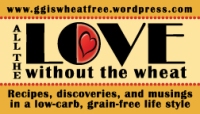Life is…
When talking to interested (but skeptical) people, about my family’s experience being gluten free, a phrase that comes up a LOT in regards to giving up wheat, even for a week-long trial, is:
“Life is too short to go without the things I love!”
In other words: “I deserve to enjoy my favorite foods and beverages in whatever shape and quantity I desire because it makes me happy right now. And I deserve to be happy! I work hard, I deserve pleasure and treats. Besides, I feel fine. Wheat isn’t hurting me. If I was sick, maybe I would consider it.”
When you look around at the health of our nation and our world, it is becoming more and more clear that this feeling of entitlement in combination with addictive substances, has created a deadly trend. There is more obesity and diabetes in adults and children than there has ever been. Auto-immune diseases are telling us that our bodies are fighting hard against things in our environment that we aren’t even aware of. When our immune system resources are being taxed so much by daily living, we have fewer resources left to fight off other threats to our health. While it is true that there are many potential hazards in our environments, there isn’t one that enters your system as directly and consistently as food, nor is there one over which we can exercise more control than our individual diets.
Hmmmm. I don’t know about you, but I am going to be 43 next month, and I have plans to be around until I’m between 85 and 105 😀 If something out of my control happens in the meantime, so be it, but I plan to do my part to be in good health for those remaining 42-62 years!!! I say:
“Life is too LONG to go without the things I love!”
The things I love happen to be health, peace of mind, wellness, love itself, creativity, freedom, energy, and to be a positive example to my son as well as other people in my life and world. I think that being deprived of these things is much worse than skipping pizza or making the vast majority of my meals at home. Looking at the big picture, those things are much more important to me than having convenient fast food, toxic carbs and sugars which create a temporary high, followed by regret and ill feelings. I want to control my food, not be controlled BY it.
Don’t get me wrong, I totally understand the mindset that forgoing a certain food (or even material possession) equals deprivation. I mean, that is what our society is trained to believe since birth. Brainwashing us (err… I mean, Marketing) towards unhealthy foods as being “popular”, “exciting” and “hip”, starts when we are small children and continues… well, forever. Do you see cartoon characters advertising fresh produce? Did you ever dig to the bottom of a bag of carrots to find a toy? Or see a commercial where a bunch of trendy 20-somethings are sitting around discussing the benefits of eating greens every day, juicing or going without sugar? I haven’t. The Jolly Green Giant was probably the closest thing to a veggie mascot, and I miss him!
Back to the deprivation mindset… mindset and education is where we first need to make our changes. Having facts to build on, and then adjusting our perspective, is key to making lasting changes. So is imagination. It can be only a few small steps from imagining yourself in a healthy lifestyle and enjoying being free from pain (or fatigue, or excess weight, or…) and actually being there! It takes a dedication to your vision, because it might not be a one-step fix. There is much empowerment to be had by taking those first mental steps and then seeing the results. There is a quote I liked from a movie called The Edge with Anthony Hopkins and Alec Baldwin… “What one man can do, another can do.” Meaning that the difference is in determination and drive, not in ability in most cases. It’s down to wanting and needing to do something. Making up your mind.
Argument for Deleting the Wheat
Even if you don’t suspect you are gluten intolerant, or haven’t been diagnosed with celiac disease, understanding the toxicity of wheat can be enlightening. Don’t believe the hype from some that gluten is a trendy new allergen. It is a toxin, and it is not digestible whether or not you have celiac disease!
A large part of the problem is that wheat products are so deeply ingrained (haha, punny) into the fabric of our society that it seems incomprehensible that they could be literally toxic. I had a hard time coming to terms with that concept at first too, but reading Wheat Belly by Dr. William Davis really made a difference to my understanding. According to Davis (and supported by facts and research), the wheat of today is not the wheat of our ancestors; it has been changed a multitude of times through hybridization.
While hybridizing is not the same as genetic modification (GMOs, think Monsanto), it still changes the properties and composition of a plant from what it was before. A certain amount of this happens in nature on its own from cross-pollination, so on the surface it seems harmless. Scientists approach hybridizing with certain goals; in the case of wheat it was to enlarge the seed head to increase yield. When that was accomplished, further changes needed to be made to keep the wheat stalk from buckling over under the weight of the heavy tops, which ruined harvests. So now, instead of the “amber waves of grain” of our forebears, and 4 foot tall wheat plants, today’s wheat is about 2 feet tall on a stocky, sturdy plant.
This all sounds good so far… and it is good from a standpoint of increased production and being able to feed more people with less land (a noble goal, indeed.) However, not all the changes in wheat are ones that can be seen with the naked eye. The changes on the outside also changed the nutritive makeup on the inside, causing the gluten content to skyrocket. In fact, NEW glutens are present in modern wheat that were not present in the “parents” that it came from.
So what? Well, humans have evolved at a much slower pace in the sense that our digestive systems have not changed to keep pace with the new wheat. In fact, when wheat underwent all this modification, no studies were done to check that the end product was even fit for human consumption! I suppose it was just assumed that it would break down in the same ways as the old wheat, and that all was good. Unfortunately, that is not the case, which leads us to the current state of recognizing gluten intolerance and celiac disease.
The changes in wheat are one aspect, but the effects are compounded by the fact that wheat is no longer just eaten as a grain or in a piece of bread like our ancestors did… this ubiquitous grain is used everywhere in a myriad of products, in places you might not even think to look. This push of wheat (which is now plentiful and cheap thanks to the hybridization to increase yield) into so many processed foods has dangerously increased our exposure to gluten. Our bodies treat gluten as a toxic substance which triggers an immune system response, and leads to a host of health issues. On top of that, add in the addictive properties of wheat which cause us to crave more wheat-containing products and calories.
Addictive, I say? YES. Not just because we are in the habit of having bread and cereal and sweets, but because wheat is literally addictive in the sense that when it is digested, it results in certain polypeptides that cross into the brain and bind to opiate receptors. OPIATE RECEPTORS? Yep. As in drugs. Grains without gluten do not have the same effect… so this is an issue specific to wheat (also rye, spelt, triticale.) The fact that wheat acts like an opiate in the brain would explain why people are so defensive about going without it! Whether we know it or not, even the most health-conscious among us is getting a “fix” from that morning slice of 9-grain toast (ok, that was my vice!) To take this WHEAT as OPIATE stance one step further, there have been studies done that prove that the opiate-blocking drugs naloxone and naltrexone can be used to block the brain response to the wheat-derived polypeptides which create addiction and out of control appetite. This makes it easier to understand why we go through withdrawal symptoms when we drop the wheat in favor of a gluten free diet! And you can bet that those drugs are being researched as potential diet medications! The problem is that even if we manage to block the opiate response in the brain, continuing to eat wheat will continue to wreak havoc inside the body.
The other major argument against wheat is in regards to the insulin effect, and it applies to other high carbohydrate foods as well. This includes sugary foods in addition to alternate flours like rice, tapioca, potato, sorghum, etc. That is why I have chosen to not only go gluten free, but low carb. Many people who realize that they are intolerant to gluten first mourn the loss of bread, pasta, crackers, doughnuts etc… but then rapidly turn to alternate flours or ready-made processed gluten free foods on the market as a substitute. (I did that for the first week or so myself, until I read Wheat Belly.) While it’s true that a gluten intolerant person can eat these and bypass the symptoms such as headache, joint pain and digestive issues, the substitutions are every bit as bad for blood sugar as wheat products are.
This leads to weight gain (or at least prevents weight loss) and continues the risk of developing chronic health conditions. Also, the type of weight (visceral fat) that is gained because of insulin spikes is the kind that one carries around their midsection, which not only shows on the outside, but also wraps and permeates the organs on the inside (liver, kidneys, pancreas), causing inflammation and preventing the release of protective molecules which normally aid the body in preventing heart disease, diabetes and hypertension. There is a lot of science behind this, and I strongly recommend Dr. Davis’ book for a thorough and understandable explanation.
This is the reason you will see that the few baked goods that I include in my blog are based on using almond or coconut flours which are very low carb and a good source of protein. I have no interest to go to the lengths I have to improve my health just to sabotage myself with insulin-spiking foods. I am not judging anyone else for sharing their delicious solutions to gluten free baking that include other types of flours and starches, but personally those do not match the goals I have set for myself. (I realize that not everyone wants to lose weight, but even those who aren’t overweight can develop insulin resistance through repeated spikes in blood sugar.)
Let me help, let the community help… You are NOT alone!
So why did I bother to write this article if I am already off the wheat? To help you. To make a difference. To spread the word. To start/continue a movement. To educate. To start a dialog. To reinforce my own commitment and share. To get to know you. Really.
While it’s true that I am busy helping myself and my family, I know that in the world community we can also help each other through some of the rough spots. It is my sincere belief that if even one person decides to try going gluten free to help relieve their migraines, or joint pain, or any other symptom, because of something I wrote, it is well worth every hour spent crafting these words. But I would be ecstatic to influence as many as possible!
My personal family testimony may or may not be convincing to you, as I know it amounts to anecdotal evidence, but I share an update here anyway:
- I haven’t had a migraine in the 7 weeks since I went gluten free. (3-4x week prior.)
- My IBS symptoms are slowly improving all the time.
- My joint pain (shoulders, hips, knees) is gone.
- I have lost 14 lbs so far.
- I never feel deprived of food, and eat when I’m hungry. No cravings.
- I am sleeping well.
- My skin and hair looks and feels healthier.
- I have more patience and less anxiety.
- I have more energy and focus, less frequent brain fog.
- My husband has lost 18 lbs so far.
- He hasn’t had an incidence of acid reflux in 7 weeks. (suffered often after meals prior.)
- He has much increased energy and confidence.
- His chronic shoulder pain has eased tremendously.
- My son has increased focus.
- He has gained about 5 lbs so far. (He needs to gain, not lose.)
- He eats more often, finishes his lunch instead of leaving it.
- He sleeps better.
- His skin is clearer.
- His frequent “growing pains” have subsided.
- He has a sense of control knowing he can make his own health decisions.
Hopefully your discovery or diagnosis of gluten intolerance or celiac disease will open up a world of health benefits and wonderful foods that far outweigh the perceived restrictions and limitations. Just think, it just might be the best you’ve ever felt!!
FOR FURTHER READING:
Wheat Belly, a book by Dr. William Davis, and his Wheat Belly Blog.
Gluten:Bad for us All, and article by Dr. Rodney Ford
The Dark Side of Wheat, Part I and Part II, by Sayer Ji







